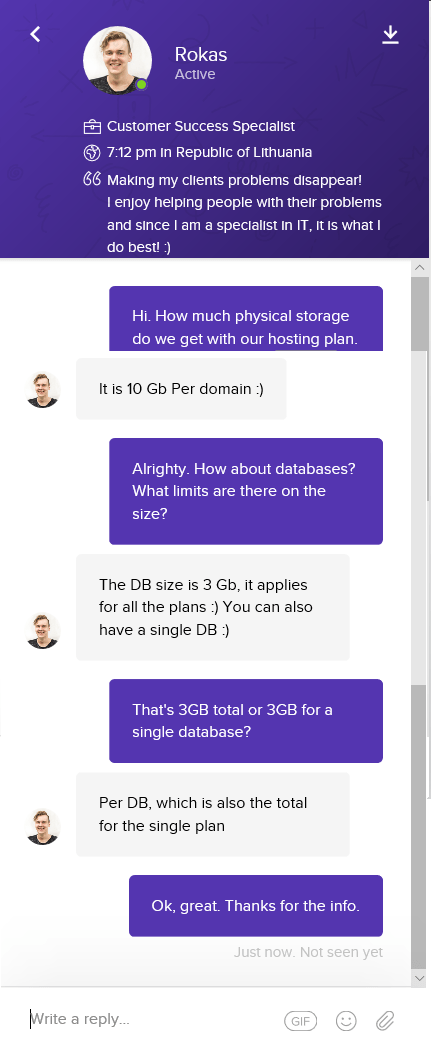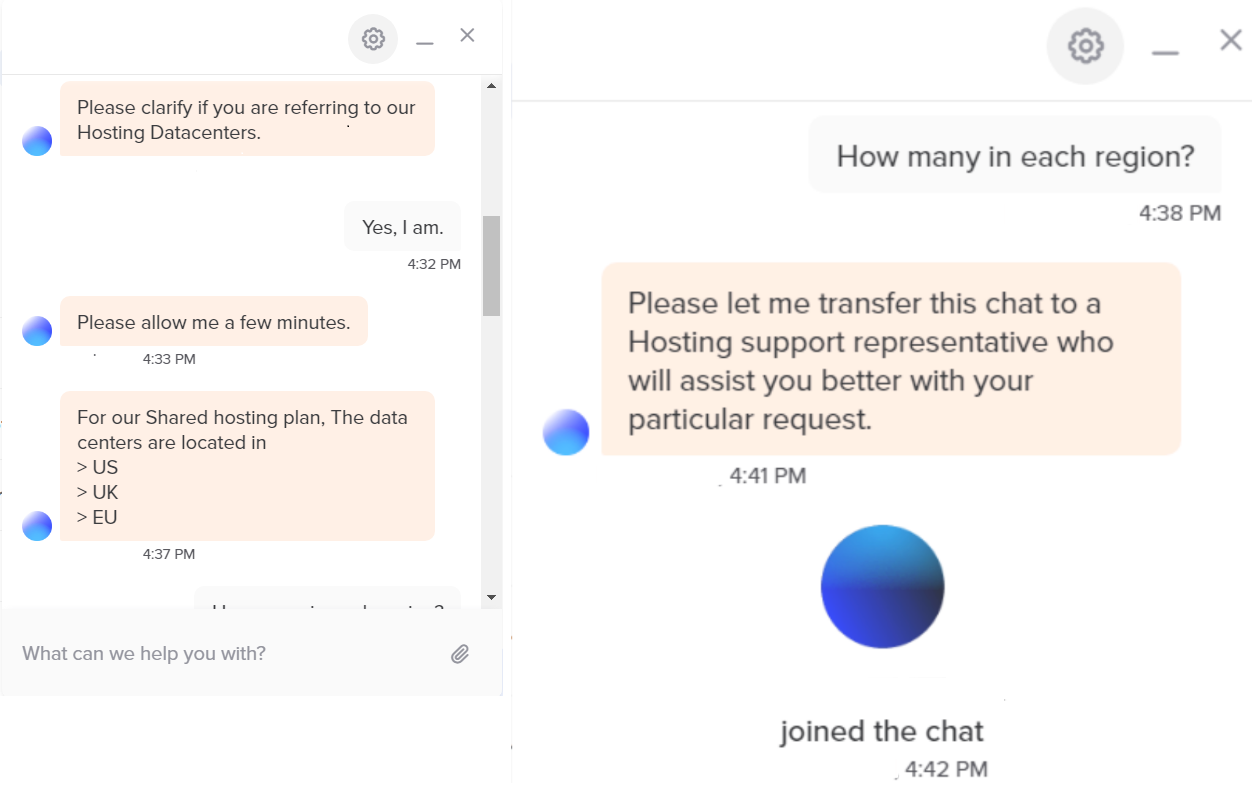Inside this Article
1. Plans and Pricing
Hostinger Lets You Save Considerably While Namecheap Isn’t That “Cheap”
Both these providers offer shared, WordPress and email hosting along with VPS. Additionally, Namecheap offers reseller hosting and dedicated servers while Hostinger offers cloud VPS. Shared and WordPress hosting plans of both these providers are available with 4-tiered pricing for Hostinger and 3-tiered pricing for Namecheap. Hostinger’s WordPress plans are cheaper (with the 48-month term) than Namecheap’s managed WordPress plans. However, the monthly term is more expensive with Hostinger’s prices being 3-5x of Namecheap hosting renewal prices. Hostinger’s VPS prices are lower than Namecheap’s though you’ll have to make a long-term commitment (quadrennial) to get the cheapest rates. Namecheap offers domains at cheaper rates (especially TLDs like .com, net, etc.) than Hostinger. Both providers offer a 30-day money-back guarantee to let you try their plans risk-free. Hostinger Web Hosting
Plan NameStorageBandwidthFree SSLNumber of SitesPriceFree Months
More detailsA free domain name is included with some hosting plans from Hostinger
Namecheap Web Hosting
Plan NameStorageBandwidthNumber of SitesPrice
More detailsA free domain name is included with some hosting plans from Namecheap
2. Features
Hostinger Edges Past Namecheap Due to its Slightly Better Features
Hostinger’s shared plans offer CloudLinux OS, 1X-4X memory and processing power, hPanel (custom-developed control panel), LSCache, SSD disk space, Cloudflare protected nameservers, DNS management, WordPress acceleration (LSCWP), free SSL, free domain (for the first year with annual or longer-term of premium and business plans), 1-click installer with 100+ apps, and a website builder (free for 1 month). With Namecheap’s shared hosting, you’ll get one free domain (with the annual term), free automatic SSL installation (for the first year), auto-backup (for the 2 higher plans), free Softaculous app installer with 100+ apps, free website builder, free migration, and jailed SSH. With its 2 higher WordPress plans, Namecheap offers free CDN while all 3 WordPress plans of Hostinger offer free CDN. To answer the question- “Is Hostinger good for WordPress?” I’d say yes, it is. But if you need hand-holding, Namecheap’s managed plans would be better. Compare Hostinger vs. Namecheap quickly and side-by-side by utilizing this comparison table.| Hostinger | Namecheap | |
| Hosting Types | Shared hosting, WordPress hosting, email hosting, cloud hosting, and VPS | Shared, WordPress, email, and reseller hosting plus VPS and dedicated servers |
| Free Domain | ✓(conditional) | ✓(conditional) |
| Free SSL Certificate | ✓ | ✓ (for the first year) |
| Disk Space | 50GB SSD-200GB NVMe (shared plans) | 20GB SSD-50GB SSD |
| Bandwidth | 100GB-unlimited | Unmetered |
| Automatic Backups | Daily/Weekly (plan-dependent) | Daily/Weekly/Monthly (plan-dependent) |
| Control Panel | hPanel | cPanel |
| Email accounts | 1-unlimited | 30-unlimited |
| Free CDN | ✓(Hostinger CDN in top 2 WordPress plans) | ✓(Free Supersonic CDN with all plans) |
| Free Site Migration | ✓ | ✓ |
| Money-Back Guarantee | 30 days | 30 days |
3. Performance
Hostinger Comfortably Outperforms Namecheap
Namecheap storage uses SSDs, as do the basic Hostinger plans. However, the two higher-end Hostinger plans use NVMe SSD, which is much faster. While Namecheap lets you choose from 3 data centers (one each in the UK, continental Europe, and the US), Hostinger has 10 Tier-3 redundant data centers across Europe, Latin America, Asia, and the US. To deliver enhanced performance, Hostinger uses LSCache plugins, Cloudflare CDN, dual uplinks with multiple ISPs for high availability, and GZIP compression. Namecheap utilizes fully redundant data centers and incorporates eAccelerator and xCache (to enhance the performance of PHP), CDN, and cloud storage (with a US data center and no downtime) to boost its speed and reliability.Hostinger gives you a credit-backed 99.9% uptime guarantee and performed extremely well in our performance tests. Check details at our expert Hostinger review.
Namecheap offers 100% and 99.9% uptime guarantees for its shared/business/dedicated servers and VPS/reseller hosting respectively. It offered blazing-fast page loading speeds in our tests, the details of which are available at our expert Namecheap review.
4. Security
Hostinger Outshines its Competitor Easily
With Hostinger, you don’t need to worry about your website’s security as it employs comprehensive and robust security measures. It uses SSL certificate, CDN, RAID-10 for data redundancy, weekly/daily backups, LVE containers for account isolation, prognostic and proactive monitoring of server, Wanguard anti-DDoS protection, and Bitninja/Imunify360 (web application firewall). Namecheap’s basic security measures include account security measures (like custom security notifications, custom password recovery options, and dynamic support pin numbers), two-factor authentication, and DDoS protection. It also offers free CDN and paid VPN but still falls short of Hostinger’s all-inclusive security. Hostinger’s robust security wins this round.5. Support
Hostinger’s Lightning-Fast Support Scores Over Namecheap’s Slow Support
Getting help from Hostinger is easy, thanks to its 24/7 live chat, ticket, and email support (available for logged-in users). There’s a faster paid “Priority Support” too. My experience of using Hostinger’s live chat was impressive with lightning-fast replies.

Hostinger Takes the Winner’s Crown
While Namecheap is a good host overall, Hostinger wins the overall competition, with superior performance, features, pricing, security, and support. So, my vote goes to Hostinger. If you are still not sure why Hostinger is a good choice, know that it also sits at the top of our list of the best web hosting services.Comparison Table
Hostinger
Namecheap
Plans and Pricing
Budget-friendly WordPress VPS hosting along with email hosting and cloud hosting
Slightly more expensive Shared, WordPress, and VPS, plus email, reseller hosting, and dedicated servers
Key Features
1X-4X memory and processing power, hPanel, LSCache, SSD, Cloudflare protected nameservers, DNS management, WordPress optimizations, and Hostinger CDN
Free features including a domain, automatic SSL installation, Softaculous auto-installer, website builder, migration, and SuperSonic CDN
Performance
Credit-backed 99.9% uptime guarantee; Advanced caching features to enhance speed
100% and 99.9% uptime guarantee for shared/business/dedicated servers and VPS/reseller hosting respectively
Security
SSL certificate, CDN, RAID-10, weekly/daily backups, Wanguard anti-DDoS protection, and Bitninja/Imunify360
Basic account security measures, two-factor authentication, and DDoS protection plus free CDN and paid VPN
Support
24/7 live chat, ticket, and email support plus paid Priority Support; knowledgebase for self-support
Ticket and 24/7 live chat support; knowledgebase for self-support







![8 Best Enterprise WordPress Hosting (Scalable & Reliable) [2025]](https://dt2sdf0db8zob.cloudfront.net/wp-content/uploads/2024/11/Best-Enterprise-WordPress-Hosting-1.png)
![8 Best Enterprise WordPress Hosting (Scalable & Reliable) [2025]](https://dt2sdf0db8zob.cloudfront.net/wp-content/uploads/2023/05/Caitlin-Greyling-150x150.jpg)








